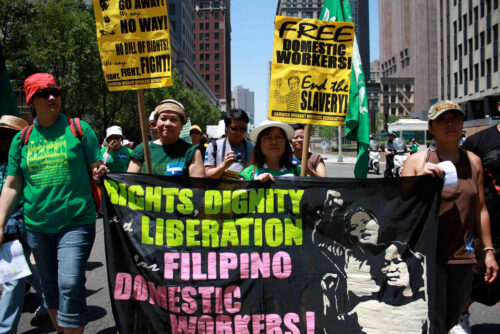Our forthcoming book, Caring For America, traces the various stories of home care workers. We follow home care’s political trajectory in both New York and other cities, such as Chicago, Los Angeles, and San Francisco, to see how workers and community organizers experimented with strategies that would make unionism in this sector succeed for clients and caretakers. Successful strategies include organizing in the community, direct action tactics, mass visits to the legislature, female rank and file leadership, and a new kind of steward system that could meet the needs of workers who often could not leave the home. We also write about social movements among the disabled and the elderly, which became crucial to home care workers organizing. Not only did workers organize on their own, but they cultivated political strategies and relationships at the state level. They too sought public benefits that would enable them to live with security and dignity. Together, they took labor that seemed private and projected it into the public sphere, turning the welfare state into their terrain of social struggle. They have also had to build concepts and strategies reflective of the increasingly complex inter-personal relations essential to care work.
Before the current recession, New York’s home care aides made less than those in California, where unions more successfully gained higher wages through bargaining with the state. Many still had to rely on the strategies of the poor—turning to welfare or Medicaid, living with relatives, and taking on extra jobs. One of these retired workers, Jamaican immigrant Evelyn Coke, became the plaintiff in a high-profile lawsuit initiated by SEIU to challenge their exclusion from FLSA. Coke spent twenty years cooking for, cleaning up after, and bathing clients on Long Island, sometimes working twenty-four-hour shifts but rarely paid for overtime. 1
Coke v. Long Island Care at Home exposed the limits of the search for care on the cheap. In its brief to the Supreme Court, New York City rationalized the exemption on the basis of expense. In contrast, civil, women’s, and immigrant rights groups stressed the need to correct prior discrimination against household workers and revalue domestic labor. In foregrounding the concerns of receivers of domestic and personal services, Associate Justice Stephen Breyer erased the presence of providers. The Court unanimously ruled against Coke in 2007. 2 However, it left open the door for Congressional action or administrative rule changes. Long-term care could be added to social insurance, so that it becomes a right of citizenship.
Yet as our historical research has found, it takes personal and social transformation to tackle the more fundamental challenge: revaluing the labor of care. Trade unionism or other forms of collective organization, as with Domestic Workers United in New York, enables home-based caregivers to find others doing the same labor, recognize it as real work, form cultures of solidarity across race and ethnic lines, and become active political agents who put in the forefront the most urgent needs of our society. Such care worker unionism pleas for larger social benefits, advocating better care and better jobs. It not only seeks to make the home a place of dignity and respect for all those who labor there, but to recognize our fundamental human connection.



